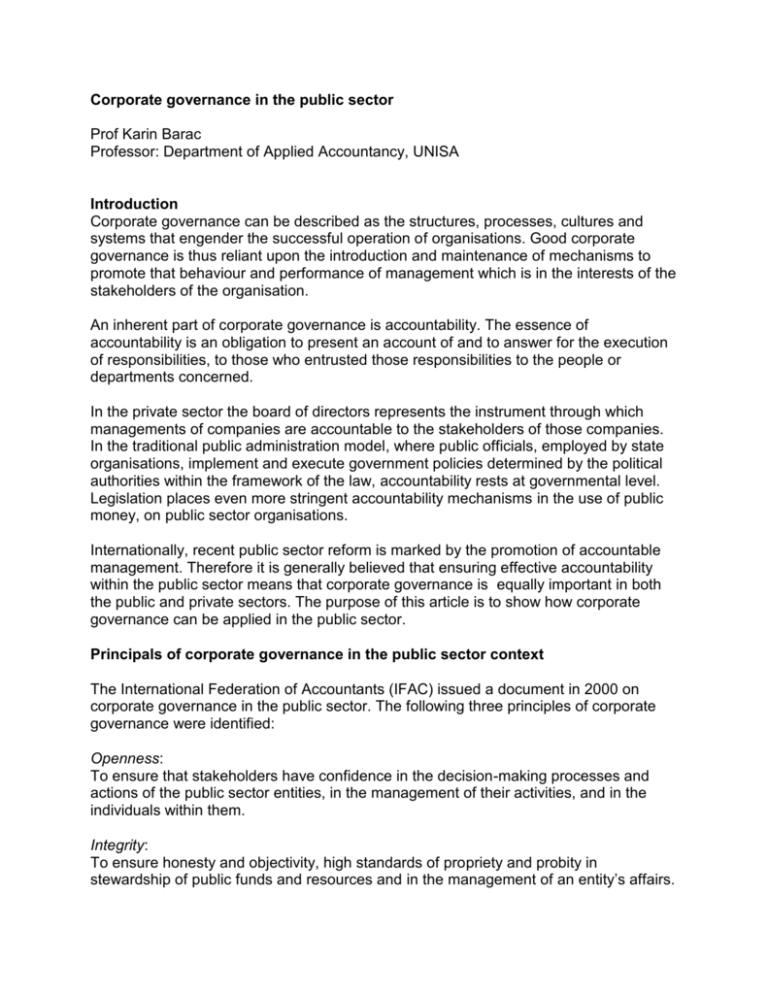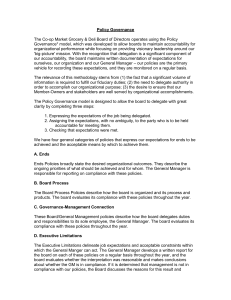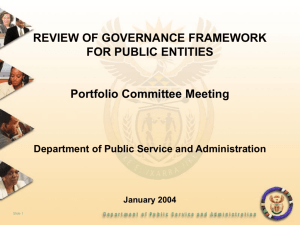Corporate Governance in the Public Sector
advertisement

Corporate governance in the public sector Prof Karin Barac Professor: Department of Applied Accountancy, UNISA Introduction Corporate governance can be described as the structures, processes, cultures and systems that engender the successful operation of organisations. Good corporate governance is thus reliant upon the introduction and maintenance of mechanisms to promote that behaviour and performance of management which is in the interests of the stakeholders of the organisation. An inherent part of corporate governance is accountability. The essence of accountability is an obligation to present an account of and to answer for the execution of responsibilities, to those who entrusted those responsibilities to the people or departments concerned. In the private sector the board of directors represents the instrument through which managements of companies are accountable to the stakeholders of those companies. In the traditional public administration model, where public officials, employed by state organisations, implement and execute government policies determined by the political authorities within the framework of the law, accountability rests at governmental level. Legislation places even more stringent accountability mechanisms in the use of public money, on public sector organisations. Internationally, recent public sector reform is marked by the promotion of accountable management. Therefore it is generally believed that ensuring effective accountability within the public sector means that corporate governance is equally important in both the public and private sectors. The purpose of this article is to show how corporate governance can be applied in the public sector. Principals of corporate governance in the public sector context The International Federation of Accountants (IFAC) issued a document in 2000 on corporate governance in the public sector. The following three principles of corporate governance were identified: Openness: To ensure that stakeholders have confidence in the decision-making processes and actions of the public sector entities, in the management of their activities, and in the individuals within them. Integrity: To ensure honesty and objectivity, high standards of propriety and probity in stewardship of public funds and resources and in the management of an entity’s affairs. Integrity is dependent on the effectiveness of the control framework and on the personal standards and professionalism of individuals within the entity. Accountability: To ensure public sector entities and individuals within them are responsible for their decisions and actions, including the stewardship of public funds and all aspects of performance, and submit themselves to appropriate external scrutiny. Complexity of the public sector Public sector entities do not operate within a common legislative framework and their sizes and shapes differ. It is therefore not possible to develop one set of recommendations for corporate governance applicable to all public sector entities. Corporate governance in public entities Public entities, as described in the Public Finance Management Act, No 1 of 1999, have accounting authorities which are responsible for leadership and strategic direction, defining control mechanisms, monitoring the overall management of the entity’s activities and reporting on stewardship and performance. This accounting authority resembles a board of directors in the private sector. The methods of corporate governance by which companies in the private sector are directed and controlled are therefore also applicable to public entities. Corporate governance in public entities requires that effective and appropriate measures are established to ensure statutory accountability and accountability for public money. Communication with stakeholders should be open and transparent and the roles and responsibilities of the accounting authority, the chief financial officer and non-executives should be clearly defined. Appointments to the accounting authority should be made according to specified criteria, adequate and sufficient training programmes should be accessible and a policy for executive remuneration should be followed. Objective, balanced, understandable and timeous reporting, (including a shareholder’s compact), is required, and appropriate accounting standards should be applied. The accounting authority should also ensure that a framework of internal control is established which actually operates in practice, contains effective systems of risk management and carries out an effective internal audit function. Audit committees should be established, comprised of non-executive members with the responsibility for an independent review of the framework of internal control and the external audit process. Measures should be in place to ensure that the accounting authority complies with annual budget circulars and that prescribed requirements are met when loans or guarantees are incurred. Standards of behaviour are to be accepted by all employees to ensure the openness, integrity and accountability of everyone within the public entity. Corporate governance in departments, trading entities In departments, trading entities and constitutional institutions power is exercised in a more hierarchical and less collegial manner. Nearly all of the aspects relating to corporate governance in the private sector and for public entities, as discussed above, are included in the Public Finance Management Act, 1999 and treasury regulations for departments and constitutional institutions. The roles and responsibilities of the accounting officer, the chief executive officer and the chief financial officer are clearly defined. Objective, balanced, understandable and timeous reporting is also required and appropriate accounting standards should be applied. The accounting officer is responsible for the implementation and maintenance of internal control, together with effective systems of risk management and an effective internal audit function. In terms of treasury regulations for departments and constitutional institutions, audit committees should also be established. Measures should be implemented to ensure that prescribed requirements are met with regard to budgeting, management of revenue, monitoring the assets and liabilities of the departments and constitutional institutions, and when public-private partnerships are entered into. Standards of behaviour should also be accepted to ensure the openness, integrity and accountability of all employees, including the accounting officer and chief financial officer. Summary In the film Shadow and Fog, Woody Allen said: “I was in a warm bed, and suddenly I am part of a plan”. Many individuals in the public service must experience that same feeling, because although corporate governance principles have been part of the public sector for years, as included in statutes and regulations (eg. the Public Finance Management Act, 1999, treasury regulations for departments and constitutional institutions and draft treasury regulations for public entities), as well as in other initiatives in the public sector, these principles have never been addressed formally as corporate governance. Those who are well aware of the changes that formal corporate governance policies will cause and the eventual challenges facing the public sector will, with adequate preparation and planning, be more likely to overcome the changes, challenges and difficulties and thereby safeguard the public trust vested in them.








